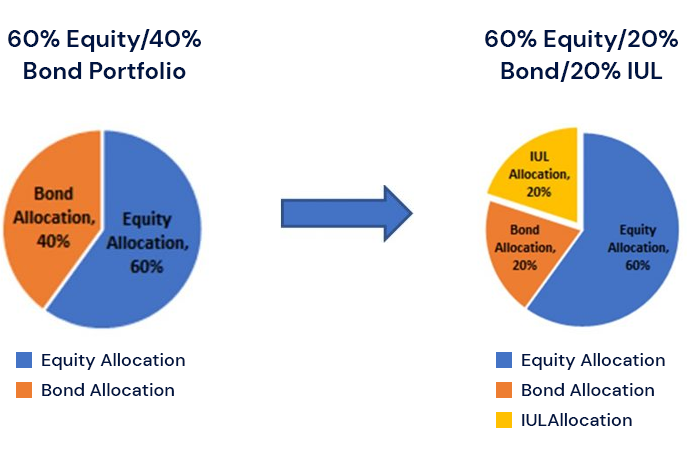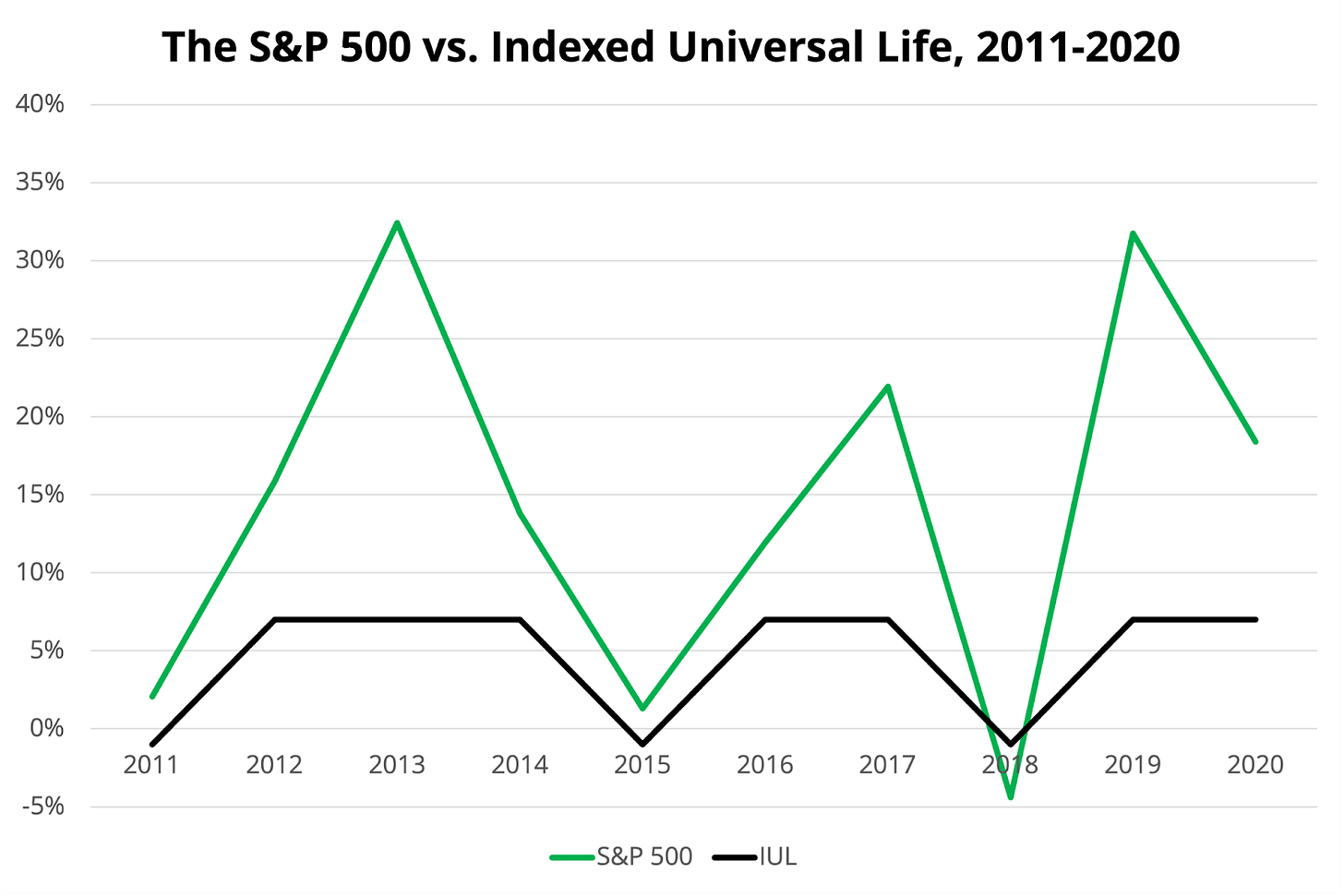All Categories
Featured
Table of Contents
1), usually in an attempt to beat their category averages. This is a straw guy debate, and one IUL individuals like to make. Do they compare the IUL to something like the Lead Overall Securities Market Fund Admiral Show to no lots, a cost ratio (ER) of 5 basis points, a turnover proportion of 4.3%, and an extraordinary tax-efficient record of circulations? No, they contrast it to some terrible actively managed fund with an 8% tons, a 2% EMERGENCY ROOM, an 80% turnover proportion, and an awful document of short-term resources gain distributions.
Shared funds typically make yearly taxed distributions to fund owners, even when the value of their fund has actually decreased in worth. Shared funds not just need income coverage (and the resulting yearly taxes) when the shared fund is rising in worth, however can additionally enforce income taxes in a year when the fund has actually dropped in worth.
That's not how common funds work. You can tax-manage the fund, collecting losses and gains in order to minimize taxed distributions to the investors, however that isn't somehow mosting likely to transform the reported return of the fund. Just Bernie Madoff types can do that. IULs stay clear of myriad tax catches. The ownership of shared funds might need the common fund proprietor to pay projected taxes.

IULs are very easy to position so that, at the proprietor's death, the recipient is not subject to either income or estate tax obligations. The exact same tax decrease methods do not work nearly also with mutual funds. There are numerous, commonly pricey, tax catches connected with the moment purchasing and marketing of common fund shares, catches that do not use to indexed life insurance policy.
Opportunities aren't very high that you're going to go through the AMT as a result of your mutual fund circulations if you aren't without them. The remainder of this one is half-truths at ideal. While it is real that there is no revenue tax obligation due to your heirs when they acquire the earnings of your IUL plan, it is also real that there is no income tax due to your beneficiaries when they inherit a common fund in a taxed account from you.
Master Iul
The federal estate tax exemption limit is over $10 Million for a pair, and expanding every year with rising cost of living. It's a non-issue for the substantial bulk of doctors, a lot less the rest of America. There are far better methods to avoid inheritance tax problems than buying investments with low returns. Common funds may create earnings tax of Social Protection advantages.

The development within the IUL is tax-deferred and may be taken as tax obligation free revenue using fundings. The plan owner (vs. the common fund manager) is in control of his/her reportable income, thus allowing them to reduce or perhaps remove the taxation of their Social Safety and security benefits. This is great.
Below's another marginal issue. It's true if you acquire a common fund for state $10 per share just prior to the distribution day, and it distributes a $0.50 distribution, you are then mosting likely to owe taxes (most likely 7-10 cents per share) although that you have not yet had any type of gains.
In the end, it's truly concerning the after-tax return, not how much you pay in tax obligations. You are going to pay more in tax obligations by using a taxable account than if you purchase life insurance policy. You're additionally probably going to have more money after paying those taxes. The record-keeping needs for having common funds are dramatically more intricate.
With an IUL, one's documents are kept by the insurer, copies of annual declarations are mailed to the owner, and circulations (if any) are completed and reported at year end. This one is also type of silly. Of training course you need to maintain your tax obligation records in instance of an audit.
Universal Life Insurance Policy Quotes
Barely a reason to acquire life insurance. Common funds are typically part of a decedent's probated estate.
Furthermore, they are subject to the hold-ups and expenses of probate. The earnings of the IUL policy, on the other hand, is always a non-probate circulation that passes outside of probate straight to one's called beneficiaries, and is for that reason exempt to one's posthumous financial institutions, undesirable public disclosure, or comparable delays and costs.
Medicaid disqualification and lifetime income. An IUL can offer their owners with a stream of revenue for their whole life time, regardless of just how lengthy they live.

This is advantageous when arranging one's events, and converting possessions to revenue before a retirement home confinement. Common funds can not be transformed in a comparable way, and are often thought about countable Medicaid assets. This is another silly one advocating that bad individuals (you understand, the ones that require Medicaid, a federal government program for the bad, to pay for their assisted living facility) need to use IUL rather than mutual funds.
Iul Vs Whole Life
And life insurance policy looks dreadful when contrasted fairly versus a retired life account. Second, individuals who have cash to acquire IUL over and past their retired life accounts are going to have to be horrible at handling money in order to ever before get approved for Medicaid to pay for their nursing home prices.
Persistent and terminal ailment rider. All policies will permit an owner's very easy access to cash from their plan, frequently waiving any kind of surrender penalties when such individuals experience a serious health problem, need at-home care, or come to be confined to a retirement home. Common funds do not provide a comparable waiver when contingent deferred sales fees still put on a common fund account whose proprietor requires to market some shares to fund the costs of such a keep.
Transamerica Index Universal Life Insurance
Yet you reach pay even more for that benefit (biker) with an insurance plan. What a lot! Indexed global life insurance policy gives fatality benefits to the recipients of the IUL owners, and neither the proprietor nor the beneficiary can ever lose cash as a result of a down market. Shared funds supply no such assurances or fatality benefits of any type of kind.
Currently, ask on your own, do you really require or want a survivor benefit? I definitely do not require one after I reach monetary self-reliance. Do I want one? I suppose if it were low-cost sufficient. Obviously, it isn't inexpensive. Usually, a buyer of life insurance policy pays for the true expense of the life insurance coverage advantage, plus the expenses of the plan, plus the profits of the insurance coverage company.
Pros And Cons Of Iul
I'm not entirely certain why Mr. Morais threw in the whole "you can not lose money" again below as it was covered quite well in # 1. He just wanted to duplicate the most effective marketing factor for these things I expect. Once again, you do not shed nominal bucks, but you can shed real dollars, as well as face significant chance expense due to low returns.

An indexed universal life insurance policy policy owner might trade their plan for a completely different plan without causing earnings tax obligations. A common fund owner can not move funds from one common fund business to an additional without offering his shares at the previous (hence setting off a taxed event), and buying new shares at the last, typically based on sales costs at both.
While it is real that you can trade one insurance plan for an additional, the reason that people do this is that the first one is such a dreadful policy that even after buying a new one and undergoing the early, negative return years, you'll still come out ahead. If they were sold the ideal plan the very first time, they should not have any type of desire to ever before exchange it and undergo the very early, adverse return years once more.
Latest Posts
Indexed Universal Life Insurance Quotes
Fidelity Iul
Term Insurance Vs Universal Life